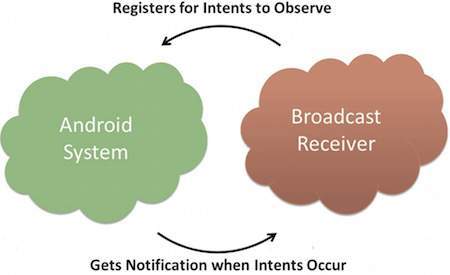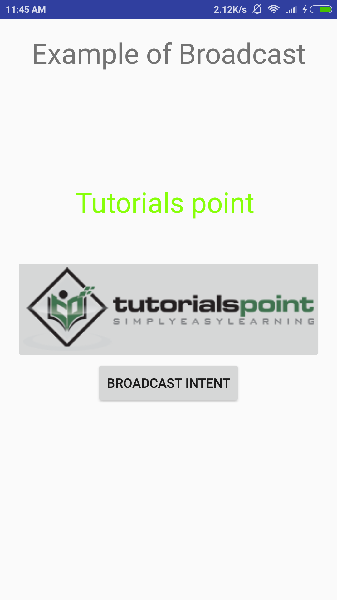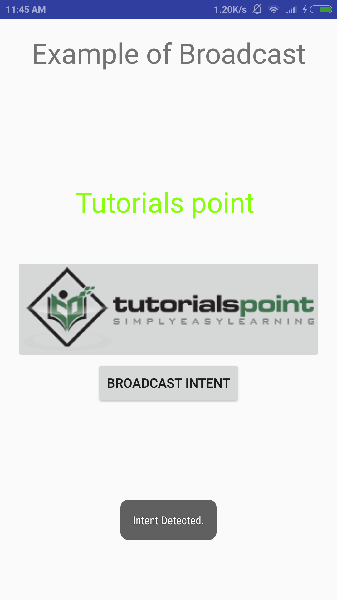Android - เครื่องรับสัญญาณออกอากาศ
Broadcast Receivers เพียงตอบสนองต่อข้อความที่ออกอากาศจากแอพพลิเคชั่นอื่นหรือจากระบบเอง ข้อความเหล่านี้บางครั้งเรียกว่าเหตุการณ์หรือเจตนา ตัวอย่างเช่นแอปพลิเคชันสามารถเริ่มการแพร่ภาพเพื่อแจ้งให้แอปพลิเคชันอื่นทราบว่ามีการดาวน์โหลดข้อมูลบางส่วนไปยังอุปกรณ์และพร้อมใช้งานดังนั้นนี่คือเครื่องรับสัญญาณที่จะขัดขวางการสื่อสารนี้และจะเริ่มการดำเนินการที่เหมาะสม
มีขั้นตอนสำคัญสองขั้นตอนต่อไปนี้เพื่อให้ BroadcastReceiver ทำงานกับ Intent ที่ออกอากาศของระบบ -
การสร้างตัวรับการออกอากาศ
การลงทะเบียนเครื่องรับสัญญาณออกอากาศ
มีขั้นตอนเพิ่มเติมอีกหนึ่งขั้นตอนในกรณีที่คุณจะใช้ Intent ที่กำหนดเองจากนั้นคุณจะต้องสร้างและถ่ายทอด Intent เหล่านั้น
การสร้างตัวรับการออกอากาศ
เครื่องรับสัญญาณออกอากาศถูกนำมาใช้เป็นคลาสย่อยของ BroadcastReceiver คลาสและแทนที่เมธอด onReceive () ที่แต่ละข้อความได้รับเป็นไฟล์ Intent พารามิเตอร์วัตถุ
public class MyReceiver extends BroadcastReceiver {
@Override
public void onReceive(Context context, Intent intent) {
Toast.makeText(context, "Intent Detected.", Toast.LENGTH_LONG).show();
}
}การลงทะเบียนเครื่องรับสัญญาณออกอากาศ
แอปพลิเคชันจะรับฟังความตั้งใจในการออกอากาศเฉพาะโดยการลงทะเบียนเครื่องรับสัญญาณออกอากาศในไฟล์AndroidManifest.xml พิจารณาว่าเรากำลังจะลงทะเบียนMyReceiverสำหรับเหตุการณ์ที่ระบบสร้างขึ้น ACTION_BOOT_COMPLETED ซึ่งระบบจะเริ่มทำงานเมื่อระบบ Android เสร็จสิ้นกระบวนการบูต

เครื่องรับสัญญาณออกอากาศ
<application
android:icon="@drawable/ic_launcher"
android:label="@string/app_name"
android:theme="@style/AppTheme" >
<receiver android:name="MyReceiver">
<intent-filter>
<action android:name="android.intent.action.BOOT_COMPLETED">
</action>
</intent-filter>
</receiver>
</application>ตอนนี้เมื่อใดก็ตามที่อุปกรณ์ Android ของคุณบูตเครื่องจะถูกขัดขวางโดย BroadcastReceiver MyReceiverและตรรกะที่ใช้งานภายในonReceive ()จะถูกดำเนินการ
มีเหตุการณ์ที่ระบบสร้างขึ้นหลายเหตุการณ์ที่กำหนดเป็นฟิลด์คงที่สุดท้ายในไฟล์ Intentชั้นเรียน ตารางต่อไปนี้แสดงเหตุการณ์ของระบบที่สำคัญบางอย่าง
| ซีเนียร์ No | ค่าคงที่ของเหตุการณ์และคำอธิบาย |
|---|---|
| 1 |
android.intent.action.BATTERY_CHANGED การออกอากาศแบบติดหนึบที่มีสถานะการชาร์จระดับและข้อมูลอื่น ๆ เกี่ยวกับแบตเตอรี่ |
| 2 |
android.intent.action.BATTERY_LOW แสดงสถานะแบตเตอรี่ต่ำบนอุปกรณ์ |
| 3 |
android.intent.action.BATTERY_OKAY แสดงว่าแบตเตอรี่โอเคหลังจากที่เหลือน้อย |
| 4 |
android.intent.action.BOOT_COMPLETED จะออกอากาศครั้งเดียวหลังจากที่ระบบบูทเสร็จสิ้น |
| 5 | android.intent.action.BUG_REPORT แสดงกิจกรรมเพื่อรายงานข้อบกพร่อง |
| 6 | android.intent.action.CALL ทำการโทรหาบุคคลที่ระบุโดยข้อมูล |
| 7 | android.intent.action.CALL_BUTTON ผู้ใช้กดปุ่ม "โทร" เพื่อไปที่แป้นหมุนหมายเลขหรือ UI อื่น ๆ ที่เหมาะสมสำหรับการโทรออก |
| 8 | android.intent.action.DATE_CHANGED วันที่มีการเปลี่ยนแปลง |
| 9 | android.intent.action.REBOOT ให้รีบูตอุปกรณ์ |
การถ่ายทอดเจตนาที่กำหนดเอง
หากคุณต้องการให้แอปพลิเคชันของคุณสร้างและส่ง Intent ที่กำหนดเองคุณจะต้องสร้างและส่ง Intent เหล่านั้นโดยใช้เมธอด sendBroadcast ()ภายในคลาสกิจกรรมของคุณ หากคุณใช้เมธอด sendStickyBroadcast (Intent) Intent คือstickyซึ่งหมายความว่าIntent ที่คุณกำลังส่งจะยังคงอยู่หลังจากการออกอากาศเสร็จสิ้น
public void broadcastIntent(View view) {
Intent intent = new Intent();
intent.setAction("com.tutorialspoint.CUSTOM_INTENT");
sendBroadcast(intent);
}com.tutorialspoint.CUSTOM_INTENTเจตนานี้ยังสามารถลงทะเบียนในลักษณะเดียวกันกับที่เราได้สร้างระบบ regsitered ขึ้น
<application
android:icon="@drawable/ic_launcher"
android:label="@string/app_name"
android:theme="@style/AppTheme" >
<receiver android:name="MyReceiver">
<intent-filter>
<action android:name="com.tutorialspoint.CUSTOM_INTENT">
</action>
</intent-filter>
</receiver>
</application>ตัวอย่าง
ตัวอย่างนี้จะอธิบายวิธีสร้างBroadcastReceiverเพื่อสกัดกั้นเจตนาที่กำหนดเอง เมื่อคุณคุ้นเคยกับจุดประสงค์ที่กำหนดเองแล้วคุณสามารถตั้งโปรแกรมแอปพลิเคชันของคุณเพื่อสกัดกั้นเจตนาที่ระบบสร้างขึ้น ลองทำตามขั้นตอนต่อไปนี้เพื่อแก้ไขแอปพลิเคชัน Android ที่เราสร้างในHello World ตัวอย่างบท -
| ขั้นตอน | คำอธิบาย |
|---|---|
| 1 | คุณจะใช้ Android studio เพื่อสร้างแอปพลิเคชัน Android และตั้งชื่อเป็นแอปพลิเคชันของฉันภายใต้แพ็คเกจcom.example.tutorialspoint7.myapplicationตามที่อธิบายไว้ในบทตัวอย่าง Hello World |
| 2 | แก้ไขไฟล์กิจกรรมหลักMainActivity.javaเพื่อเพิ่มเมธอดbroadcastIntent () |
| 3 | สร้างไฟล์ java ใหม่ชื่อ MyReceiver.javaภายใต้แพคเกจcom.example.tutorialspoint7.myapplicationเพื่อกำหนด BroadcastReceiver |
| 4 | แอปพลิเคชันสามารถจัดการกับความตั้งใจที่กำหนดเองและระบบได้ตั้งแต่หนึ่งรายการขึ้นไปโดยไม่มีข้อ จำกัด ทุกเจตนาที่คุณต้องการสกัดกั้นจะต้องลงทะเบียนในไฟล์AndroidManifest.xmlของคุณโดยใช้แท็ก <receiver ... /> |
| 5 | แก้ไขเนื้อหาดีฟอลต์ของไฟล์res / layout / activity_main.xmlเพื่อรวมปุ่มเพื่อกระจายเจตนา |
| 6 | ไม่จำเป็นต้องแก้ไขไฟล์สตริง Android studio ดูแลไฟล์ string.xml |
| 7 | เรียกใช้แอปพลิเคชันเพื่อเปิดโปรแกรมจำลอง Android และตรวจสอบผลลัพธ์ของการเปลี่ยนแปลงที่ทำในแอปพลิเคชัน |
ต่อไปนี้เป็นเนื้อหาของไฟล์กิจกรรมหลักที่แก้ไข MainActivity.java. ไฟล์นี้สามารถรวมวิธีวงจรชีวิตพื้นฐานแต่ละวิธี เราได้เพิ่มเมธอดbroadcastIntent ()เพื่อถ่ายทอดเจตนาที่กำหนดเอง
package com.example.tutorialspoint7.myapplication;
import android.app.Activity;
import android.content.Intent;
import android.os.Bundle;
import android.view.View;
public class MainActivity extends Activity {
/** Called when the activity is first created. */
@Override
public void onCreate(Bundle savedInstanceState) {
super.onCreate(savedInstanceState);
setContentView(R.layout.activity_main);
}
// broadcast a custom intent.
public void broadcastIntent(View view){
Intent intent = new Intent();
intent.setAction("com.tutorialspoint.CUSTOM_INTENT"); sendBroadcast(intent);
}
}ต่อไปนี้เป็นเนื้อหาของ MyReceiver.java:
package com.example.tutorialspoint7.myapplication;
import android.content.BroadcastReceiver;
import android.content.Context;
import android.content.Intent;
import android.widget.Toast;
/**
* Created by TutorialsPoint7 on 8/23/2016.
*/
public class MyReceiver extends BroadcastReceiver{
@Override
public void onReceive(Context context, Intent intent) {
Toast.makeText(context, "Intent Detected.", Toast.LENGTH_LONG).show();
}
}ต่อไปนี้จะเป็นเนื้อหาที่แก้ไขของ ไฟล์AndroidManifest.xml เราได้เพิ่มแท็ก <receiver ... /> เพื่อรวมบริการของเรา:
<?xml version="1.0" encoding="utf-8"?>
<manifest xmlns:android="http://schemas.android.com/apk/res/android"
package="com.example.tutorialspoint7.myapplication">
<application
android:allowBackup="true"
android:icon="@mipmap/ic_launcher"
android:label="@string/app_name"
android:supportsRtl="true"
android:theme="@style/AppTheme">
<activity android:name=".MainActivity">
<intent-filter>
<action android:name="android.intent.action.MAIN" />
<category android:name="android.intent.category.LAUNCHER" />
</intent-filter>
</activity>
<receiver android:name="MyReceiver">
<intent-filter>
<action android:name="com.tutorialspoint.CUSTOM_INTENT">
</action>
</intent-filter>
</receiver>
</application>
</manifest>ต่อไปนี้จะเป็นเนื้อหาของ res/layout/activity_main.xml ไฟล์เพื่อรวมปุ่มเพื่อถ่ายทอดเจตนาที่กำหนดเองของเรา -
<RelativeLayout
xmlns:android="http://schemas.android.com/apk/res/android"
xmlns:tools="http://schemas.android.com/tools"
android:layout_width="match_parent"
android:layout_height="match_parent"
android:paddingLeft="@dimen/activity_horizontal_margin"
android:paddingRight="@dimen/activity_horizontal_margin"
android:paddingTop="@dimen/activity_vertical_margin"
android:paddingBottom="@dimen/activity_vertical_margin"
tools:context=".MainActivity">
<TextView
android:id="@+id/textView1"
android:layout_width="wrap_content"
android:layout_height="wrap_content"
android:text="Example of Broadcast"
android:layout_alignParentTop="true"
android:layout_centerHorizontal="true"
android:textSize="30dp" />
<TextView
android:id="@+id/textView2"
android:layout_width="wrap_content"
android:layout_height="wrap_content"
android:text="Tutorials point "
android:textColor="#ff87ff09"
android:textSize="30dp"
android:layout_above="@+id/imageButton"
android:layout_centerHorizontal="true"
android:layout_marginBottom="40dp" />
<ImageButton
android:layout_width="wrap_content"
android:layout_height="wrap_content"
android:id="@+id/imageButton"
android:src="@drawable/abc"
android:layout_centerVertical="true"
android:layout_centerHorizontal="true" />
<Button
android:layout_width="wrap_content"
android:layout_height="wrap_content"
android:id="@+id/button2"
android:text="Broadcast Intent"
android:onClick="broadcastIntent"
android:layout_below="@+id/imageButton"
android:layout_centerHorizontal="true" />
</RelativeLayout>ลองเรียกใช้การแก้ไขของเรา Hello World!แอปพลิเคชันที่เราเพิ่งแก้ไข ฉันถือว่าคุณได้สร้างไฟล์AVDในขณะที่ทำการตั้งค่าสภาพแวดล้อม หากต้องการเรียกใช้แอปจาก Android studio ให้เปิดไฟล์กิจกรรมของโครงการแล้วคลิก


ตอนนี้เพื่อถ่ายทอดเจตนาที่กำหนดเองของเราให้คลิกที่ Broadcast Intentปุ่มนี้จะถ่ายทอดเจตนาที่กำหนดเองของเรา"com.tutorialspoint.CUSTOM_INTENT"ซึ่งจะถูกขัดขวางโดย BroadcastReceiver ที่ลงทะเบียนของเราเช่น MyReceiver และตามตรรกะที่ใช้งานของเราขนมปังปิ้งจะปรากฏที่ด้านล่างของเครื่องจำลองดังต่อไปนี้ -

คุณสามารถลองใช้ BroadcastReceiver อื่น ๆ เพื่อสกัดกั้นเจตนาที่ระบบสร้างขึ้นเช่นการบูตระบบวันที่เปลี่ยนแบตเตอรี่ต่ำเป็นต้น